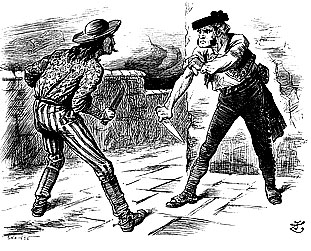|

'The Duel' |
Reactions
to this New Imperialism
The Irish-Americans' support for the war continued even
after the invasion of Puerto Rico.
It is semiofficially announced that Porto Rico will
be held by the United States as a naval and military station,
commanding the West Indies. Its possession will go toward
making up the heavy expenses of the War to the United
States. Our flag -once run up- will float over the islands
permanently. (23 July 1898)
The comparisons to Ireland continue and Meehan attempts
to justify US imperialism as a form of assistance and
not exploitation. He compares English and Spanish imperialism
and claims that England has changed its tactics. England
now adopts legal measures to control its subjects while
Spain tries to bully them into submission. US imperialism,
on the other hand, will be neither brutal nor political,
because its principle goal is assisting the Islands.
The
government of Spain, over her colonies, had been, like
that of England over Ireland under the Crommwellian conquest;
and it produced naturally the same results-insurrections
of the people, driven to despair against the irresponsible
military tyranny to which they were being subjected […]
But there is a difference. The wily Anglo-Saxon has always
adopted the legal and parliamentary method of robbing
its victims of their rights; while the Spaniard true to
his African instincts relies on his big guns, - and fails.
[Now] we shall know whether our example, for the liberty
of the human race, has borne its appropriate fruit. In
the advocacy of human freedom the United States has always
stood alone… (30 July 1898)
In
this framework, the US is obligated to take over these
Islands because of a moral obligation to help them.
Spain
surrendered to the US in October 1898 and it gave up control
of its colonies to the US. When it became clear that Cuba
was to become independent and Puerto Rico was to remain
under U.S. control, [4]
the debate on the repercussions of the United States becoming
a colonising nation reared its head. The Irish-American
maintained that the Puerto Ricans were better off with
their new status than they were under Spanish control
and continued to print articles that vilified Spain. However,
by 1899, as the US policies of control became more apparent,
the Irish-American began to speak out against
the Government policies regarding Puerto Rico. The paper
felt that the government was putting unfair taxes on the
Islanders which would hinder economic growth. The ‘lower
House of Congress, last week, passed a tariff bill inflicting
an almost intolerable and unnecessary revenue burden on
the island of Puerto Rico’ (3 March 1898).
Conclusion
In spring 1900, as the Foraker Act [5]
was being debated in congress, The World published
an article entitled ‘Shall Porto Rico be our Ireland?’
The article implies that Puerto Rico should be automatically
granted the right to statehood. It was one of a number
of articles and editorials in both newspapers which question
the tariffs that were being levied on Puerto Rican products.
Both papers opposed the way the federal government was
treating the Puerto Rican colonists and demonstrated empathy
for them. They resented seeing the United States follow
a British example, by incorporating Puerto Rico the same
way they had seen Ireland become part of the British Commonwealth
a hundred years before in the Act of Union.
Many
of the other headlines referred to Puerto Ricans as ‘Colonists’
and criticised the McKinley administration for denying
the Puerto Ricans their rights. Their empathy and self-identification
with the Puerto Rican people is evident and their prediction
of what would occur in the island under US occupation
was dire.
Eileen
Anderson
Notes
[1]
The author is a PhD. Candidate at University of North
Carolina at Chapel Hill. She is finishing her dissertation
entitled, “Resisting Anglicization: Strategies of Identity
Formation in Irish and Puerto Rican Communities in the
United States”.
[2]
It also referred to as the British-American Alliance in
the Irish World
[3]
A regiment based out of New York that fought in the Revolutionary
War and the Spanish-American War. Historically, the men
in the unit were of Irish descent.
[4]
Even after the Treaty of Paris, there was still fighting
in the Philippines.
[5]
This act established a civilian government in Puerto Rico
and put into effect all federal laws of the United States
on the island. It was based on the ideas of the British
Commonwealth system. It gave the Puerto Ricans limited
representation and no voting rights.
References
-
Doyle, David Noel, Irish Americans: Native Rights
and National Empires: the Structure, Divisions, and Attitudes
of the Catholic Minority in the Decade of Expansion, 1890-1901
(New York: Arno Press, 1976).
- Ellis, Elmer (ed.), Mr. Dooley at his Best
(New York: Scribner's Sons, 1938).
- Fanning, Charles (ed.), Peter Dunne Finley. Mr.
Dooley and the Chicago Irish: The Autobiography of a Nineteenth-Century
Ethnic Group (Washington, D.C.: Catholic UP, 1987).
- Filler Louis (ed.), The World of Mr. Dooley
(New York: Collier Books, 1962).
- Green, Paul (ed.), Mr. Dooley in Peace and in War
(Urbana: University of Illinois Press, 1988).
- Irish World and American Industrial Liberator articles
from January 1898 to May 1900.
- Irish-American articles from January 1898 to May 1900.
- Miller, Kerby A., Emigrants and Exiles: Ireland
and the Irish Exodus to North America (New York:
Oxford University Press, 1985).
- McCaffrey, Lawrence, The Irish Diaspora in America
(Bloomington: Indiana University Press, 1976).
- O'Grady, Joseph P., How the Irish Became Americans
(New York: Twayne Publishers, 1973).
- Rodechko James Paul, ‘Patrick Ford and his search
for America: a case study of Irish-American journalism,
1870-1913’, PhD. dissertation (University of Connecticut,
1967).
|

